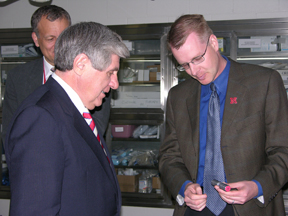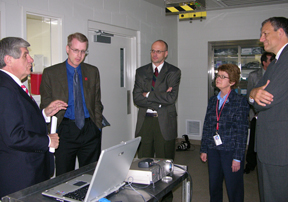 |
Sen. Ben Nelson, left, with Shane Farritor, Ph.D. Byers Shaw, M.D., is in the background. Photos by Vicky Cerino. |
Earlier in the week, Nelson had been instrumental in getting the Senate Armed Services Committee to approve $3 million in earmarked funds to go toward further development of the mini-robot program, which has been developed by a team from UNMC and the University of Nebraska-Lincoln. The funding, which still requires approval from the House and the full Senate, would come through the 2007 National Defense Authorization Act.
Nelson met with Byers Shaw, M.D., professor and chairman of the UNMC Department of Surgery, and two UNL engineers, Shane Farritor, Ph.D., and Stephen Platt, Ph.D., as they showed him a brief presentation in a surgical training room on the second floor of The Lied Transplant Center.
The robots were co-designed by Dmitry Oleynikov, M.D., director of minimally invasive surgery at UNMC, and Dr. Farritor, associate professor of mechanical engineering at UNL.
“This is a truly collaborative effort involving several campuses, representing a remarkably unique situation among academic institutions,” Dr. Shaw said. “I believe we have succeeded rapidly where some of the more famous powerhouse academic institutions have failed because of our ability to combine expertise from our various departments. All too often, intramural political and competitive pressures work to foil meaningful success – that simply hasn’t been a problem in Nebraska, and it is a tribute to the individual scientists involved in the project.
 |
From left: Sen. Ben Nelson, Shane Farritor, Ph.D., Stephen Platt, Ph.D., Marsha Morien, and Byers Shaw, M.D. |
Dr. Oleynikov, who was out of town on a business trip when Nelson came to UNMC, echoed Dr. Shaw’s feelings on the economic potential of the mini-robots. “We feel the mini-robots could spawn a high tech industry in Nebraska that has not been available before. The economic impact could be significant.”
The mini-robots, which are about the size of a tube of lipstick, could be used in many different settings – from diagnosing and treating soldiers injured in combat to performing emergency surgery on astronauts during a space mission. They are equipped with cameras and lights that allow surgeons to view inside the patient’s abdominal cavity. Some robots have surgical tools that would allow them to clamp an artery, cauterize a wound or take a tissue sample for a biopsy.
So far, the mini-robots have only been used in surgeries involving animals, Dr. Farritor said. By the end of this year or early next year, they hope to perform their first surgeries in humans, he said.
Should this additional funding come through, the UNMC/UNL team would use it to manufacture 200-300 more robots. “We’ve done several animal surgeries to make sure that we do no harm,” Dr. Farritor said. “But, we need to mass produce more of these robots so that we can broaden the program by involving more surgeons.”
Nelson was impressed with what he saw. “This is something we need,” he said. “We want to make sure it happens. Authorizing this life-saving project is important to the continuing strength of our military and the well being of our troops. I’m pleased with the role the University of Nebraska is playing in advancing and innovating America’s defense systems and technology.”
The UNMC/UNL team also is seeking a two-year, $400,000 grant from the National Institutes of Health that would allow them to make further refinements on the mini-robots. Dr. Farritor said the team expects to find out later this month if the grant will be funded.